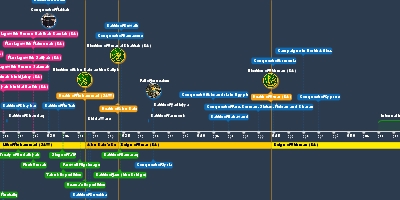Battle of Siffin (26 Jul 657 Jahr – 28 Jul 657 Jahr)
Beschreibung:
## **Causes:**- After his election, Ali deposed Muawiyyah from the governorship of Syria. Maliyah refused and under his influence no one in Syria took the oath of allegiance to the new Caliph.
- Muawiyyah raised a cry for revenge for the blood of Usman and displayed his blood stained clothes and his wife’s fingers in a mosque in Damascus.
- He claimed that his election as Caliph was illegal and was carried out under the pressure of the rebels who had killed Usman.
- He presented Talha and Zubair as martyrs who laid down their lives for the blood of Usman.
- He criticized Ali for the ill treatment of Hazrat Ayesha.
- His propaganda spread to Iran and Iraq.
- Muawiyyah gained enough strength in a year to challenge the Caliph.
- Ali wrote him a letter telling him that he had been elected in the same way as the former Caliphs had been elected.
- Muawiyyah replied that he was not ready to accept Ali as a Caliph.
- 'Ali was reluctant to fight fellow Muslims but Mu’awiya who was an Umayyad and the Governor of Syria refused to accept ‘Ali as the caliph till the murderers of ‘Uthman were brought to justice.
- ‘Ali in turn wanted to stabilise the empire then deal with the assassins of ‘Uthman as it was not the work of one man but several.
## **Events:**
- The battle of Siffin was fought between ‘Ali and Mu’awiyah.
- The battle of Siffin followed the battle of Camel, in which ‘Ali was victorious, and was fought in Muharram in 37A.H.
- Ali managed to collect an army of 80 000 men and Muawiyyah also collected a large army.
- Both armies met at Siffin. For several months the rival soldiers remained facing each other. Except occasional skirmishes no decisive battle took place.
- There was a pause in fighting during the month of Muharram, as it was a sacred month.
- Ali sent messengers to Muawiyyah asking him to submit in the interest of the unity of Islam.
- Muawiyyah in reply demanded that Usman’s assassins should be punished first. All negotiations for peace broke down and both sides got ready for war.
- The main battle began on the 8th of Safar 37 A.H. on the fourth day the position of Muawiyyah ’s army began to worsen.
- Fighting continued for several days between the two sides with loss of life on both sides but when the battle started to turn in favour of ‘Ali,
- Muawiyyah, on the advice of Amr bin Aas ordered the soldiers in the front ranks to fasten the Holy Quran on their lances as a sign that the war should end. (Is this true?)
- Many officers in Ali’s army refused to fight, so the war was stopped and it was decided that the matter be referred to an arbitration (mediation/settlement).
- 'Ali to agree to a truce, according to the terms of the truce the dispute about the caliphate was to be referred to two arbitrators, one from each side, to meet within six months.
- The battle of Siffin gave birth to a secession movement, the disenchanted elements of the army from Kufa and Basra refused to set up camp with the rest of the garrison on their return from the battle, they came to be known as the Kharijites. The Kharijites were bitterly opposed to the idea of arbitration, however ’Ali treated them with compassion and persuaded them to return to their homes.
Zugefügt zum Band der Zeit:
Datum:
26 Jul 657 Jahr
28 Jul 657 Jahr
~ 2 days
